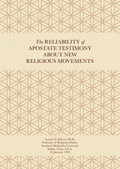I have been asked by the Church of Scientology to give my expert opinion on two broad issues: (1) The incidence of apostasy in new religious movements and (2) The reliability of apostate accounts of their former religious beliefs and practices. These two questions are of crucial importance for a proper understanding of new religious movements because such apostates are often singled out as reliable informants about their former beliefs and practices in media exposés and even scholarly studies of non-traditional religious movements. Moreover, a limited number of apostates have filed grievances for damages, variously charging their former religious communities with deceptive and fraudulent practices or physical and emotional duress. In turn, these individual litigants have often served as expert witnesses in other cases brought against new religions either by governmental agencies or by hostile dissidents.
In the past, apostates were roundly condemned for abandoning their faith.
The special attention given by the media to apostates from new religious movements and their recourse to the courts for alleged damages suffered at the hands of their former religious group involves a profound shift in the public attitude toward and treatment of apostates in this century. In the past, apostates were roundly condemned for abandoning their faith. Indeed, the punitive action taken against the apostate by the rejected religious group was often reinforced by the power of the state. By contrast, in recent years the apostate is more likely to take punitive action against the religious group, sometimes with the support of the law. Apostates from new religious movements are often seen as victims rather than as turncoats by virtue of the harshly negative stories they tell about their religious past. But the question remains whether these apostate accounts are reliable reports of their past religious associations and activities.
The Church of Scientology’s special interest in the question of the reliability of apostates is based on the fact that it has been the target of apostate-based media “exposés” and civil litigation. In anticipation of the full discussion that follows, I am convinced by reason of my own professional training and scholarly research that the apostate should not be accepted uncritically by the mass media, the scholarly community, the legal system, or governmental agencies as a reliable source of information about new religious movements. The apostate must always be regarded as an individual who is predisposed to render a biased account of the religious beliefs and practices of his or her former religious associations and activities.





























